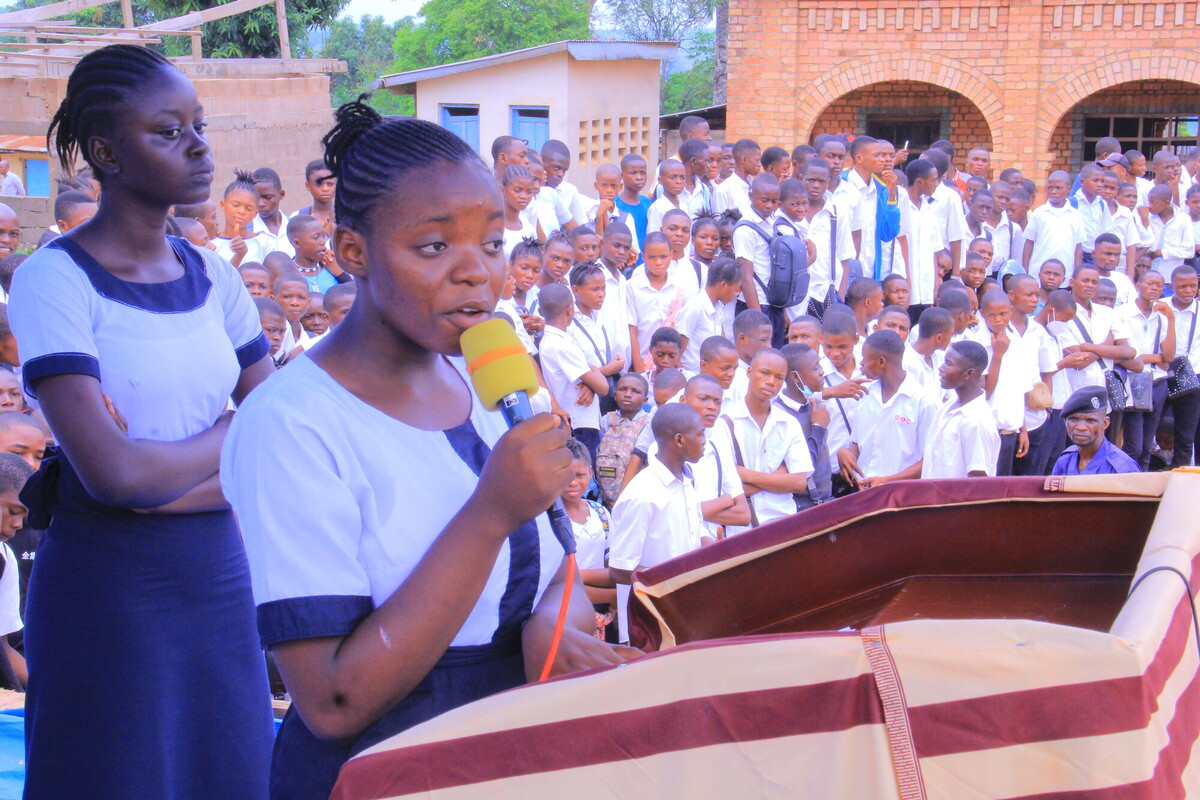High-level attendance from key provinical leaders
Pictured above, from left to right: Hon. Andre Mushongo, Provincial Member of Parliament; President of the National Assembly; H.E. Noella Ayaganagato, National Minister of Youth; Deputy Governor; H.E. Alphonsine Bundu, Provincial Minister of Gender; Dr. Mike Mpoyi, Ipas DRC National Program Manager; young schoolgirls.
The event was attended by the National Minister for Youth and all the provincial authorities, including the Governor of Tshikapa Province, the Provincial Police Commissioner, the Provincial Minister for Gender and Youth, the Provincial Minister of Home Affairs, the Provincial Minister of Budget, and the Provincial Minister of Transportation, the Provincial Inspector of National Education, the Provincial Minister for Education, the First President of the Court of Appeal, the Attorney General and the Provincial Coordinator of the National Human Rights Commission.
Kasaï province faces major challenges affecting girls’ rights. Harmful practices such as early marriage, unwanted pregnancies, and gender-based violence are deeply entrenched, with devastating consequences on the lives of young girls. Pregnancies, often linked to a lack of access to sexual information and appropriate contraceptive methods, hinder girls’ education, expose them to physical and mental health risks, and restrict their ability to decide. In the Democratic Republic of Congo (DRC), and more specifically in Kasaï province, 29% of girls under 18 have already married; child marriage is a common practice in the region, often arranged by families for economic or social reasons. Such forced unions deprive girls of their childhood and education and expose them to the risk of domestic violence and maternal complications.
On International Day of the Girl Child, we launched the “CTS Nexus Strategy” with national and provincial government officials in Tshikapa, which will be the pilot city for the implementation of this approach. The CTS Nexus Strategy recognizes the interconnection between child marriage, teen pregnancy and school dropout, and promotes a variety of interventions ranging from socio-cultural transformation, innovative communication and advocacy, capacity-building and partnership across all components of society.

Dr. Mike Mpoyi, H.E. Noella Ayaganagato and H.E. Alphonsine Bundu standing with schoolgirls.
Political engagement is key to effectively addressing child marriage, teen pregnancy and school dropout. — Dr. Mike Mpoyi, Ipas DRC National Program Manager
Ipas seized the opportunity to not only launch its strategy, but also to measure the appropriation level and positioning of the national and provincial authorities. Indeed, it is essential to improve measures and policies in favor of girls’ rights, as well as the protection of survivors of gender-based violence and sexual violence, including the full implementation of the Maputo Protocol.
In her speech, the National Minister of Youth stressed the need for access to accurate sexual information to help young people make informed decisions about their sexuality, the need to integrate reproductive health education into the school curriculum, and the need for local authorities to monitor the implementation of the family code in Kasaï.
During the event, the schoolgirls took the opportunity to denounce the gender-based violence and discrimination they suffer, which has a negative impact on their lives. Taking the floor, two of them spoke about the difficulties faced by young girls in the area: “In Kasaï province, teenage mothers face a lot of mockery. It really takes courage for them to continue their studies after becoming pregnant, as they are despised by their classmates,” explains 15-year-old Tshibwaba.

Pictured above: Schoolgirl delivering her speech on behalf of her fellow students during the event.
Parents with no financial resources often give their daughters away in marriage. Customs that forbid young girls from speaking out in public prompted us, as part of this strategy, to set up a core group of leaders to act as ambassadors at the provincial level. Additionally, we developed a multi-sectoral consultation framework that brings together leaders, the community, young people, health experts, and political representatives.
This framework aims to identify challenges and assess progress in implementing the CTS Nexus strategy. Following this launch, we will be mapping the stakeholders over the next few months, carrying out a baseline assessment and developing a roadmap with multi-sectoral groups. Only collective efforts will enable us to reach and realize this shared vision of an inclusive society where women and girls contribute to poverty reduction and sustainable development.


